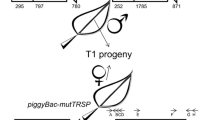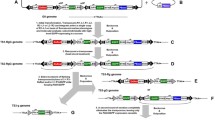Abstract
It has been proposed that amplification of genes for esterase that provide resistance to insecticides may originate from transposition events. To test this hypothesis, we have constructed a minigene coding for a soluble acetylcholinesterase under the control of a nontissue-specific promoter (hsp70). When introduced into Drosophila, the gene is expressed in all tissues and the extra acetylcholinesterase produced confers a low level of insecticide resistance (twofold). The minigene was mobilized by crossing the initial transformant with a strain providing a source of P-element transposase. After 34 generations of exposure to the organophosphate parathion, we obtained a strain with a higher resistance (fivefold). This strain had only one extra Ace gene, which overexpressed acetylcholinesterase. Thus, following transposition, resistance resulted from the overexpression of a single copy of the gene and not from gene amplification.
Similar content being viewed by others
Author information
Authors and Affiliations
Additional information
Received: 9 August 1996 / Accepted: 27 May 1997
Rights and permissions
About this article
Cite this article
Berrada, S., Fournier, D. Transposition-mediated transcriptional overexpression as a mechanism of insecticide resistance. Mol Gen Genet 256, 348–354 (1997). https://doi.org/10.1007/s004380050578
Issue Date:
DOI: https://doi.org/10.1007/s004380050578




